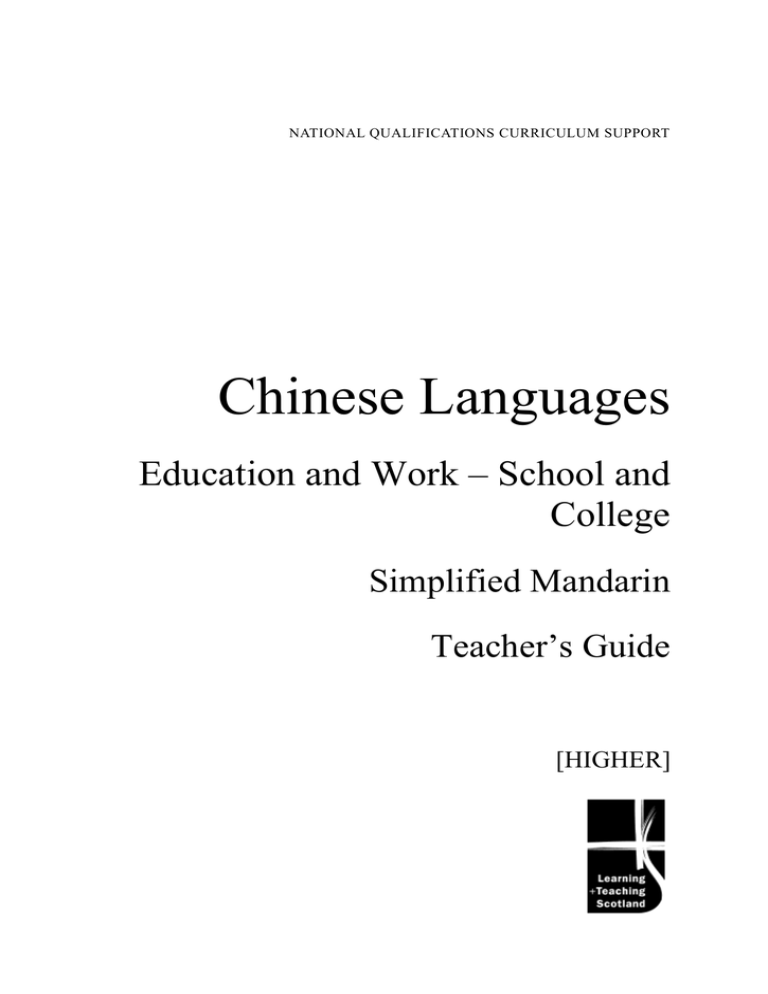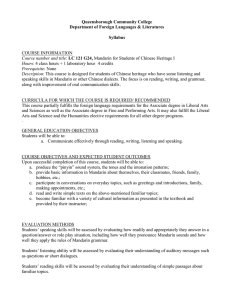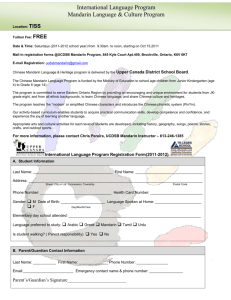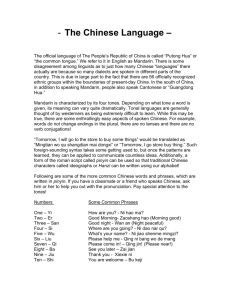Chinese Languages Education and Work – School and College Simplified Mandarin
advertisement

NATIONAL QUALIFICATIONS CURRICULUM SUPPORT Chinese Languages Education and Work – School and College Simplified Mandarin Teacher’s Guide [HIGHER] The Scottish Qualifications Authority regularly reviews the arrangements for National Qualifications. Users of all NQ support materials, whether published by Learning and Teaching Scotland or others, are reminded that it is their responsibility to check that the support materials correspond to the requirements of the current arrangements. Acknowledgement Learning and Teaching Scotland gratefully acknowledges this contribution to the National Qualifications support programme for Chinese Languages. © Learning and Teaching Scotland 2010 This resource may be reproduced in whole or in part for educational purposes by educational establishments in Scotland provided that no profit accrues at any stage. 2 EDUCATION AND WORK: SIMPLIFIED MANDARIN (H, CHINESE LANGUAGES) © Learning and Teaching Scotland 2010 Contents Introduction 4 Answers to activities Unit 1 中学生活 Activity 1: Listening comprehension Activity 2: Reading comprehension 9 10 Unit 2 中考和高考 Activity 1: Listening comprehension Activity 2: Reading comprehension 12 13 Unit 3 暑假打工 Activity 1: Listening comprehension Activity 2: Reading comprehension Activity 4: Reading comprehension 15 17 18 Unit 4 考研与就业 Activity 1: Reading comprehension Activity 3: Listening comprehension 19 20 EDUCATION AND WORK: SIMPLIFIED MANDARIN (H, CHINESE LANGUAGES) © Learning and Teaching Scotland 2010 3 INTRODUCTION Introduction This resource has been developed to support the delivery of S cottish Qualifications Authority Higher Chinese languages. It covers the topics of education and work. The aim of this material is to develop a range of learners’ skills: listening, speaking, reading and writing. The resource consists of four units of work, covering the following topics: 1. 2. 3. 4. high school life the examination system in China: senior high school entrance exam and college entrance exam summer jobs further education and employment. Each unit contains the following: short-term learning targets for the unit: these reflect requi rements for Assessment is for Learning and give opportunity for practice self-assessment at the end of each unit so that students can monitor their progress teaching materials in the form of worksheets with listening and reading activities; a word list is also provided for each listening and reading activity to support students who find using a dictionary difficult directed-speaking and directed-writing tasks, which can be used as selfassessment as well as peer assessment exercises language points, followed by a multiple-choice or sentence-making exercise (‘Over to you’). However, the following topic development areas required at Higher level are not included: 4 issues in relationships with friends/family the role of the individual in the home and in s ociety advantages/disadvantages of home area health issues EDUCATION AND WORK: SIMPLIFIED MANDARIN (H, CHINESE LANGUAGES) © Learning and Teaching Scotland 2010 INTRODUCTION comparison of types of holiday/travel past holidays/journeys critique of a local area in Scotland as a tourist centre areas of interest in target language country/countries and beyond . Articulation with Curriculum for Excellence ‘The purpose of Curriculum for Excellence is to ensure that all the children and young people of Scotland develop the attributes, knowledge and skills they will need if they are to flourish in life, learning and work, n ow and in the future.’ This resource for Higher Chinese languages echoes the requirements of Curriculum for Excellence in the following ways: Successful learners Literacy: reading and understanding the texts in Chinese with: enthusiasm and motivation for learning determination to reach high standards of achievement openness to new thinking and ideas Communication: communicating in Chinese languages with teachers, students or people from Mandarinspeaking countries Numeracy: understanding time, telephone numbers and money in Chinese languages and able to: use literacy, communication and numeracy skills use technology for learning think creatively and independently learn independently and as part of a group make reasoned evaluations link and apply different kinds of learning in new situations Think creatively and independently: expressing personal views on different issues in China, for example parents accompanying children to exams Learn independently and as part of a group: all the activities in this material can be adapted to be used with individual students, or with a group of students Make reasoned evaluations: students should be encouraged to conduct selfassessment exercises EDUCATION AND WORK: SIMPLIFIED MANDARIN (H, CHINESE LANGUAGES) © Learning and Teaching Scotland 2010 5 INTRODUCTION Confident individuals with: self-respect a sense of physical, mental and emotional well-being secure values and beliefs ambition and able to relate to others and manage themselves pursue a healthy and active lifestyle be self-aware develop and communicate their own beliefs and view of the world live as independently as they can assess risk and make informed decisions achieve success in different areas of activity 6 Relate to others and manage themselves: talking about extracurricular activities of their own and of their friends, understanding the advantages and disadvantages of taking part in extra-curricular activities Becoming self-aware: comparing the differences between life as a high school student in Scotland and in China, understanding their own exams and their own future plans Develop and communicate their own beliefs and view of the world: giving opinions on different issues in China, understanding more aspects about China Live as independently as they can: talking about part-time jobs EDUCATION AND WORK: SIMPLIFIED MANDARIN (H, CHINESE LANGUAGES) © Learning and Teaching Scotland 2010 INTRODUCTION Responsible citizens with: respect for others commitment to participate responsibly in political, economic, social and cultural life and able to: develop knowledge and understanding of the world and Scotland’s place in it understand different beliefs and cultures make informed choices and decisions evaluate environmental, scientific and technological issues develop informed, ethical views of complex issues Develop knowledge and understanding of the world and Scotland’s place in it: comparing different education/exam systems between China and Scotland, understanding the current employment situation in China and in Scotland Understand different beliefs and cultures: understand the reason why parents in China wish to accompany their children to exams, and what high school life is like in China Make informed choices and decisions: future plans, going to university or looking for a job Develop informed, ethical views on complex issues: develop awareness of educational issues in China and be able to give opinions EDUCATION AND WORK: SIMPLIFIED MANDARIN (H, CHINESE LANGUAGES) © Learning and Teaching Scotland 2010 7 INTRODUCTION Effective contributors with: an enterprising attitude resilience self-reliance and able to: communicate in different ways and in different settings work in partnership and in teams take the initiative and lead apply critical thinking in new contexts create and develop solve problems Communicate in different ways and in different settings: the activities in this resource help develop students’ skills in speaking, reading, listening and writing in Chinese Work in partnership and in teams: students should be encouraged to work with others and learn from each other when doing the activities in this material Apply critical thinking in new contexts: learners need to be advised to think critically and give opinions on, for example, students taking part time jobs Create and develop: students should use the new vocabulary and, after learning the grammar and sentence structures, should be encouraged to create new sentences of their own 8 EDUCATION AND WORK: SIMPLIFIED MANDARIN (H, CHINESE LANGUAGES) © Learning and Teaching Scotland 2010 ANSWERS TO ACTIVITES Answers to activities Unit 1 中学生活 Activity 1: Listening comprehension You are on an exchange programme, visiting a secondary school in Nanjing, China. You hear your exchange partner, Wang Jing, answering questions another visitor is asking about the school. Listening transcript 来访者: 王静: 听说, 你们的学校不错? 对,我们的学校是一所著名的重点中学,既有初中部也有高中部。 每年都有大量的新同学来我们学校上学。 来访者: 你觉得你们学校好在什么地方呢? 王静: 第一,我们学校有一流的师资,老师们不仅工作非常认真,而且对 学生很有爱心。第二,我们学校的各种设施非常齐全:有体育馆、 实验楼、音乐厅,每个教室里都有电脑。 来访者: 学校的考试成绩怎样呢? 王静: 我们中考和高考的成绩年年都排在全市前三名。 来访者: 学生有些什么样的课外活动? 王静: 各个学科都有兴趣小组,比如地理小组,他们经常组织学生去植物 园,有的时候还去野外,很有意思。 来访者: 还有什么其它的课外活动吗? 王静: 很多啊,喜欢运动的同学可以参加篮球队、排球队等体育俱乐部。 喜欢音乐的同学可以参加管弦乐队或者合唱团。另外,还有文学 社、话剧社等等。 来访者: 学生家长反对学生参加课外活动吗? 王静: 不,大多数的家长鼓励孩子参加课外活动。因为绝大部分的学生是 独生子女,参加课外活动可以有更多的机会和同龄人交流,也可以 交到更多的朋友。 EDUCATION AND WORK: SIMPLIFIED MANDARIN (H, CHINESE LANGUAGES) © Learning and Teaching Scotland 2010 9 ANSWERS TO ACTIVITIES After you’ve listened to their conversation, answer the following questions. (a) What type of school is this school? This is a famous key secondary school, with both lower and upper school s (junior high and senior high). (b) In which aspects does this school excel? They have first-class teaching staff. They are well-equipped with various facilities. (c) How are the school’s academic results? Every year, the results of the senior high school entrance exam and the college entrance exam are among the top three in the whole city. (d) What kind of activities can students do in a geography interest group? Visit the Botanic Garden and go on outings. (e) Apart from interest groups, there are many clubs available as well. Mention any three clubs. Basketball club, volleyball club, orchestra, choir, writing group, drama club (Any three of the above) (f) Why do most parents encourage their children to take part in extra curricular activities? As most students are single children in the family, their parents think that taking part in extra-curricular activities is a good way for their children to communicate with other students of their age and make more friends Activity 2: Reading comprehension After you’ve read the article, answer the following questions . (a) What extra-curricular activity is Huang Yu taking part in? She is a member of the school orchestra. (b) Why can’t Huang Yu join the school choir? Because the rehearsal time of the school choir is exactly the same as that of the orchestra. (c) What is Li Fei’s hobby? He likes writing, especially poems and prose. 10 EDUCATION AND WORK: SIMPLIFIED MANDARIN (H, CHINESE LANGUAGES) © Learning and Teaching Scotland 2010 ANSWERS TO ACTIVITES (d) What is the Spring Rain Writing Group responsible for nowadays? It is responsible for the school newspaper and the school magazine. (e) What are the normal hours of basketball training every week? From Monday to Friday: one and a half hours after school On Saturdays: half day (f) Where do students in Qian Jing’s school go for outings? Some very famous tourist attraction areas, some parks in the outskirts of Nanjing or sometimes some parks that they are very familiar with. (g) Translate ‘但其实去哪里并不十分重要,关键是我们能离开课堂,走进大 自然,享受阳光和新鲜的空气,和朋友们一起野餐,踢球,放风筝等 等。 这些都让我们感到愉快和放松。’ into English. But, in fact, we don’t care that much about where to go. The most important thing is that we can get out of the classroom and walk outside in nature, enjoy the sunshine and fresh air, and go for picnics, play football or fly kites with friends. All these make us feel happy and relaxed. EDUCATION AND WORK: SIMPLIFIED MANDARIN (H, CHINESE LANGUAGES) © Learning and Teaching Scotland 2010 11 ANSWERS TO ACTIVITIES Unit 2 中考和高考 Activity 1: Listening comprehension You pen friend, Wu Tian, is an S6 student in Chongqing, China. Wu Tian’s mum is talking to him at breakfast time about his forthcoming exam. Listening transcript 妈妈: 儿子,马上就要高考了,你准备得怎么样了?紧张吗? 吴天: 妈妈,我准备得很好,不紧张。我对自己有信心。 妈妈: 你一直都是个很有主见,很有自信心的孩子,所以爸爸妈妈对你很放 心。 吴天: 妈妈,你是医生,爸爸是公司的经理,两个人工作都很忙,所以我常 常要自己管好自己呀。 妈妈: 你的很多同学高考那天都由父母陪着去考场。但是,我们的工作单位 请假不容易,所以,你参加高考的时候,我们不会陪你去。你自己行 么? 吴天: 妈妈,别把我当小孩子了。父母陪我考试,我觉得完全没有必要,因 为我们都是成年人了,不应该因为考试而受到特殊照顾。 妈妈: 儿子,你这样想就太好了。高考确实很重要,关系到你将来上大学, 但也不 要因为一场考试把自己弄得太紧张。 吴天: 妈妈,这我懂。考试只是用来检验自己的。我平时学习很努力,一直 都名列 前茅,高考时,我会尽力发挥自己的水平的。 妈妈: 这样就对了,爸爸妈妈一定会为你加油的。不要有太大的压力,尽力 就好了。 吴天: 谢谢妈妈。 After you’ve listened to the conversation, answer the following questions . (a) What exam is Wu Tian going to sit? The College Entrance Exam. (b) What kind of child is Wu Tian in his parents’ eyes? He is a very confident person as well as a person with his own views. (c) Why does Wu Tian have to take care of himself? Because both his parents are very busy with their work. 12 EDUCATION AND WORK: SIMPLIFIED MANDARIN (H, CHINESE LANGUAGES) © Learning and Teaching Scotland 2010 ANSWERS TO ACTIVITES (d) What does Wu Tian think of parents accompanying their kids to the exams? It is not necessary. (e) In Wu Tian’s opinion, what is an exam for? It is a way to check how he is doing. Activity 2: Reading comprehension After you’ve read the article, answer the following questions . (a) In Mr Wang’s opinion, what can parents do for their children w hen they are preparing for an exam? Mention two things. Make sure their children eat well and rest well. Accompany their children to the exams. (b) What benefits does Mr Wang think his daughter will gain if he accompanies her to the exam? Reduce her pressure and help her if there is any emergency. (c) Why can’t Zhou Xin’s parents accompany him to his exams? Because they have to work in the fields every day. (d) What is Zhou Xin planning to do in the future? He is planning to study in the university then find a good job. (e) Why does Wang Wei not want his parents to accompany him to the exam? Mention any two reasons. He is not a child any more. His home is very close to the school where he is sitting the exam. Teachers from his own school are on duty all the time. If there’s anything happening, the teachers will help him. (Any two of the above) (f) How does Wang Wei feel about the exam when his parents stay outside his exam room and wait until he finishes? He becomes a little nervous. (g) What is Mr Li’s opinion on parents accompanying their children to the exams? He is against it. He thinks parents should respect their children’s feelings. EDUCATION AND WORK: SIMPLIFIED MANDARIN (H, CHINESE LANGUAGES) © Learning and Teaching Scotland 2010 13 ANSWERS TO ACTIVITIES (h) Translate: ‘我们要培养学生的健康心态。参加考试,本身就是一种锻 炼,对他 们的成长和将来适应社会都有好处。家长应该以平常心对待, 这样学生才能在考试中更好地发挥自己的水平。’ into English. We should foster our students to have a healthy mindset and attitude. Sitting exams (in itself) is good training to help them grow up and fit into society in the future. Parents should treat exams in a normal way so that the students can do their best in exams. 14 EDUCATION AND WORK: SIMPLIFIED MANDARIN (H, CHINESE LANGUAGES) © Learning and Teaching Scotland 2010 ANSWERS TO ACTIVITES Unit 3 暑假打工 Activity 1: Listening comprehension In China, all students can have nearly 2 months’ summer holiday. Liu Yufei, a university student, is talking to his friend about part -time jobs for the summer holidays. Listening transcript 同学: 刘宇飞, 放暑假了,你准备做些什么? 刘宇飞: 我准备暑假里先找份兼职工作做,然后去旅游。 同学: 刘宇飞: 兼职工作不太好找吧?你想去餐馆打工,还是做什么别的? 我有两年做家教的经验,做家教我感觉比较自信,我想我还是继续 做家教吧。 同学: 喜欢这个工作吗? 刘宇飞: 我挺喜欢这个工作的,因为很有成就感,我辅导的学生学习成绩都 有很大地提高。 同学: 你现在在大学学什么专业? 刘宇飞: 我是学物理的。 同学: 你能辅导中学生什么学科呢? 刘宇飞: 呵呵,学我们这个专业能辅导的学科多了,而且我的理科本来就学 得很好, 所以初中和高中数学、物理和化学,我都可以辅导。同学: 那你是怎么对学生进行辅导的呢? 刘宇飞: 我并不会一味地给学生做练习题,我会帮他们分析和掌握重点知 识。 同学: 那很好,你果然是个有经验的家教老师啊!你们同学做家教的多不 多? 刘宇飞: 还是挺多的。我的好朋友胡晓丽,是英文专业的学生,已通过英语 专业八级考试。 她就常常做家教。 同学: 英文家教应该也很受欢迎吧? 刘宇飞: 对。因为她特别细心,又从大一开始就一直做家教,非常有经验, 因此,她受到许多学生和家长的欢迎。她上学期间一个星期要做三 次家教。 同学: 那你们觉得做家教对你们有什么好处呢? EDUCATION AND WORK: SIMPLIFIED MANDARIN (H, CHINESE LANGUAGES) © Learning and Teaching Scotland 2010 15 ANSWERS TO ACTIVITIES 刘宇飞: 好处很多。第一,我们可以赚点零花钱。毕竟我们都是成年人了, 老是跟家里人要钱不太好意思。第二,做家教能培养我们的耐心和 爱心。还有,做家教和做其他工作一样,能培养我们的责任感。 After you’ve listened to their conversation, answer the following questions . (a) What is Liu Yufei’s plan for the summer holidays? Find a part-time job then do some travelling. (b) Liu Yufei has 2 years’ experience of working as a private tutor. How does he feel about being a private tutor? Confident. (c) He enjoys being a private tutor. Why? He has a sense of achievement, the students he helped have greatly improved. (d) What does Liu Yufei study at university? Physics. (e) What subjects can he offer to teach as a private tutor for both junior and senior middle school students? Mention any two. Maths, physics, chemistry. (Any two of the above) (f) Apart from doing practice exercises, what else does he do to help students? He helps students to analyse and grasp the learning points. (g) Many of Yufei’s friends work as part -time tutors as well. What qualification does his friend Hu Xiaoli have in English? She passed the Test for English Majors, Band 8. (h) Why is Hu Xiaoli so popular among parents and students? She is careful/considerate and experienced. (i) How often does Hu Xiaoli work as a private tutor during term time? Three times a week. (j) Give any two advantages of being a private tutor according to Liu Yufei. Earn some pocket money, build up our patience and care for others , promote a sense of responsibility. (Any two of the above) 16 EDUCATION AND WORK: SIMPLIFIED MANDARIN (H, CHINESE LANGUAGES) © Learning and Teaching Scotland 2010 ANSWERS TO ACTIVITES Activity 2: Reading comprehension After you’ve read the article, answer the following questions . (a) How many university students have part-time jobs? One-third. (b) Xiao Ming has decided that he will work during the summer holidays. Why? Give any two reasons. His home is too far away, travel is expensive, he can earn some money doing a summer job. (Any two of the above) (c) There are many ways to get job information. Mention any three. From school information board, friends and relatives, careers fair, local newspapers and websites. (d) Students will do various jobs during the summer holiday. Mention any two. Distributing flyers, waiter or waitress, supermarket sales assistant. (e) Why do most of the students feel that it is not easy to find a summer job? Give any two reasons. The private tutor market is saturated, many companies are not willing to hire part-time employees, college students don't know how to look for part-time jobs, wages are too low. (Any two of the above) (f) Why are students easily targeted by con men/women? They are unworldly, inexperienced. (g) What advice does Professor Yang of Chengdu University of Technology offer for students who have been defrauded? Get to know the job beforehand, use an authorised or registered agency, take legal action if one has been defrauded. (h) Translate ‘据调查,现在的大学生中几乎有三分之一的人在做兼职,而一 些暂时没有打工的学生也表示,只要有合适的工作,他们也愿意在暑假 的时候去做。’ into English. According to the research, almost one- third of college students are doing part-time jobs nowadays. Students who are not currently doing part -time work said they would like to do a part-time job during the summer holidays if there were appropriate jobs available. EDUCATION AND WORK: SIMPLIFIED MANDARIN (H, CHINESE LANGUAGES) © Learning and Teaching Scotland 2010 17 ANSWERS TO ACTIVITIES Activity 3: Reading comprehension After you’ve read the advertisements, answer the following questions . (一) (a) What is Linhang’s personality like? Outgoing and easy to get along with. (b) What experience does he have as a private tutor? He has one year’s experience. (c) What subject(s) can he offer as a private tutor? Biology, English and geography. (d) What pay rate does he ask for? Price can be negotiated. (二) (e) What university does Hu Xiaoli study at? Sichuan University of Technology. (f) What year grade is she in at the moment? Year three. (g) She is very popular as a private tutor. Give two reasons for this. She likes children and she is an experienced private tutor. (h) How flexible is she during the summer holiday? Available every afternoon and evening. (三) (i) What does Liuxing often do during term time at university? Takes part in various shows. (j) Give two musical instruments which Linxing ca n teach. Er hu and piano. (k) When is the best time to call her? Evening. 18 EDUCATION AND WORK: SIMPLIFIED MANDARIN (H, CHINESE LANGUAGES) © Learning and Teaching Scotland 2010 ANSWERS TO ACTIVITES Unit 4 考研与就业 Activity 1: Reading comprehension After you’ve read the article, answer the following questions . (a) Why is there enormous employment pressure on undergraduates? Menti on two things. Increasing number of undergraduates, credit crunch, less employment. (b) Most undergraduates realise that job hunting is not an easy thing to do. What two things are very demanding for job hunting? Time and energy. (c) What is the first lesson Xiao Li has learned since she graduated from university? Graduation means unemployment. (d) Why does Xiao Ma feel that he has made the right choice by taking the entrance exams for postgraduate schools? It is not easy to get a job and many people have lost t heir jobs. (e) What does Mengjiang feel about his current university? Not famous, not well-known. (f) Completion of Master ’s degree study does not guarantee a good job. How do some people feel the employment situation might be after 3 years of study? The situation might be worse than now. (g) Zhangqiang is looking forward to starting his career. How does he feel about having a job? A challenge and new experience. (h) Mention two things about Zhangqiang’s background. He is an only child and his parents will retire soo n. (i) Translate into English: ‘我从来没有想到找工作竟是那么花时间和精力的 事情。我们班的大部分同学都还没有找到工作。大学毕业就意味着失 业,这真是我们在社会上学到的第一堂课。’ I never realised that job hunting demands so much time and energy. Most of my classmates still have not found jobs yet. This must be the first lesson we have learned from the real world: graduation means unemployment. EDUCATION AND WORK: SIMPLIFIED MANDARIN (H, CHINESE LANGUAGES) © Learning and Teaching Scotland 2010 19 ANSWERS TO ACTIVITIES Activity 2: Listening comprehension At a career fair organised by Wuhan University, a journalist is interviewing Mr Wang, who is a personnel manager in a company. Listening transcript 采访 记者: 请问你们是一家什么样的企业? 王经理: 我们是一家制造玩具的私人企业。 记者: 企业目前的情况怎么样? 王经理: 我们的企业虽然规模不大,但是发展前景很好。 记者: 王经理: 请问你的企业在什么地方? 企业的总部在广州。 记者: 今天你们招聘什么职位呢? 王经理: 我们招聘一名秘书和一名电子工程师。 记者: 这两个职位工资待遇怎样? 王经理: 秘书年薪五万,工程师年薪八万。 记者: 有性别,年龄限制吗? 王经理: 性别不限,年龄要求二十五岁至四十岁之间。 记者: 你们看重应聘者的学历吗? 王经理: 我们不看重应聘者的学历,不在乎他们是否毕业于名牌大学;我 们注重的是应聘者的能力。 记者: 你们不喜欢什么样的应聘者? 王经理: 我们不喜欢那些不会把理论联系实际的学生。比如说,有些研究生 一点工作经验都没有,从小到大都是在学校读书,社会实践经验太 少。 After you’ve listened to the interview, answer the following questions . (a) What kind of products does this privately owned company make? Toys. (b) What is the current situation of the company? Small size but promising prospects. 20 EDUCATION AND WORK: SIMPLIFIED MANDARIN (H, CHINESE LANGUAGES) © Learning and Teaching Scotland 2010 ANSWERS TO ACTIVITES (c) Where are the company’s headquarters? Guangzhou. (d) What two posts are they going to recruit for? A secretary and an electronic engineer. (e) What age range should candidates be in? 25–40 years old. (f) Mr Wang does not care whether candidates have a degree or have graduated from a famous university. What does he care about? Capability. (g) What kind of candidates does he not like? Candidates who do not combine theory and practice. EDUCATION AND WORK: SIMPLIFIED MANDARIN (H, CHINESE LANGUAGES) © Learning and Teaching Scotland 2010 21



